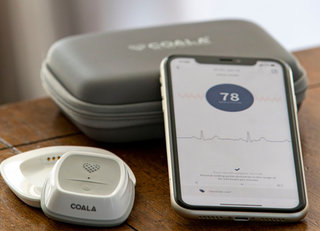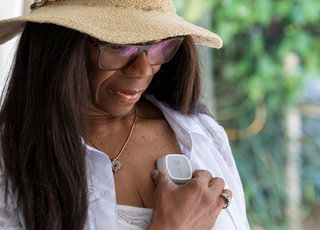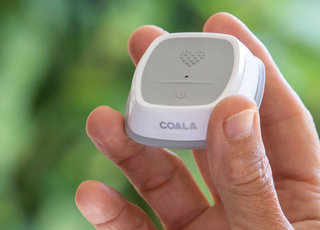Donald beat his AF thanks to Coala – without feeling like a patient
Donald has a family history of heart disease. Since his late 40’s, he’s been troubled by sporadic arrythmias that have come and gone. Thanks to the Coala Heart Monitor, though, he is now properly diagnosed and enjoying a healthy life as a retired engineer.
During this period in life, Donald held numerous public speaking engagements, and, every time, he feared of having another SVT event. One day, those fears tragically became a reality. While walking around on “Pit Road” at the Talladega 500 NASCAR race, another SVT episode hit Donald with a speeding heart rate. After another session in the hospital, Dr. Dwyer and he agreed that the ablation could no longer be put off. After a successful procedure and recovery in January of 2003, Donald was SVT-free for the next 16 years, besides some periodic low-level arrhythmias.
In 2019, Donald’s heart problems returned while having a non-cardiac related surgical procedure. Suddenly, his heart raced into atrial fibrillation. To fully assess this arrythmia, Dr. Dwyer recommended a longer-term ECG monitoring session over a few weeks in his everyday life.
“My first thought was, ‘Oh no! Not the itchy ECG patches, the wires, and the harness again for weeks.’” Luckily this time, Dr. Dwyer offered a new solution. As one of the first patients in the US, Donald was offered the Coala Heart Monitor for a 30-day cardiac evaluation.
“The Coala made me feel like Napoleon a few times every day.” The patch-free and wireless design enabled Donald to record an ECG without obstructing his daily routines, whether at church, at a restaurant, or at the ball game. “I just opened a shirt button and recorded the heart for a minute. It was wonderful not to feel like a patient, and I was in control and got immediate feedback on my recordings in my smartphone. Nothing could have been more convenient.”
Donald was prescribed to record his ECG twice a day for a month and whenever he felt symptoms. “The Coala certainly impressed me, both of the advanced technology but also the ease of use,” he comments.
After about two weeks, the Coala detected that Donald had Paroxysmal Atrial Fibrillation (AF). He saw the results on his smartphone, while Dr. Dwyer and his clinical team simultaneously saw the results in the Coala Care portal, featuring greater detail and advanced diagnostic capabilities.
“The Coala enabled us to follow Donald and his heart in real-time. We have a clinical workflow where my nurse reviews our patient’s data regularly and, if anything abnormal is detected, we discuss and simply call them into the office for treatment if needed. The process streamlines the time to diagnosis,” explains Dr. Dwyer.
Donald’s cardiac data analyzed by the Coala could then be easily shared with an electrophysiologist remotely to confirm the need of surgical treatment. Donald is now scheduled for his ablation procedure and, in the meantime, he is on anticoagulants to reduce the stroke risk related to AF by 80%. Once the ablation is completed, the plan is to reactivate the Coala and follow his heart for a few months to ensure the procedure was successful.
“I loved the Coala and so glad I did not have to have a wire monitor, or have an implantable loop recorder inside my chest,” concludes Donald.
“The first time the heart struck me was back in 1995. My legs went weak. I felt dizzy and thought I was having a heart attack,” Donald recalls. He was rushed to the emergency room, arriving with a heart rate of 220 beats per minute. “As the heart rate was medically forced down, I felt like I was floating in air,” Donald continues.
That was the start of a long patient-physician relationship between Donald and Dr. Jerome Dwyer, a leading cardiologist practicing in the St. Louis area. The event was diagnosed to be a supraventricular tachycardia, commonly known as SVT. Donald was treated initially with standard mild medication for rhythm control, but the medication’s side effects were not in his favor. As his symptoms progressed and were poorly controlled, Donald worked his way to stronger doses in despair.
Halfway through the treatment journey, Dr. Dwyer recommended a SVT ablation, though Donald did not feel he was ready. Reflecting on those days, Donald now concludes that he “was on meds for way too long.”
One of the first Coala patients in the US
Diagnosing the heart in everyday life
Real-time response and diagnostics
Ready for ablation and in love with the Coala






